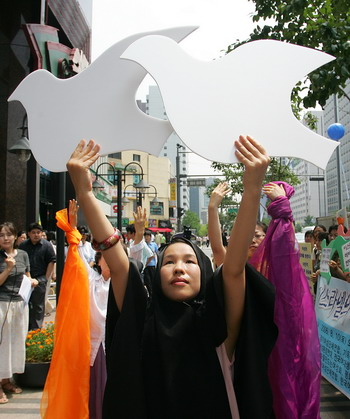Women Deny Power, Military Capability & Masculinity: Seek Daily Peace Within Confines of 'Relationships'

Women have been contributing to the peace movement by looking at the world from a 'different' angle. Feminism brings a fresh wind to the peace movement by providing new forms of awareness, which are necessary in order to critically reorganize the existing concepts of peace and security.
A belief that 'power is a prerequisite for peace' has traditionally been at the very center of the discourse on peace. For this reason, we were not very surprised by the irony behind the government's recent announcement that it would build a U.S. naval base in the island of Jeju, which had long been designated 'An Island of Peace'.
Many women, however, advocate that peace is not 'maintained' by power, military capability and masculinity, but made within the confines of 'relationships.' Feminist peace politics begins with thinking that we are able to learn the significance of being not by conquering and discriminating others, but by depending on each other in mutual relationships. The perception of interdependence overwhelms any type of unilateralism, antagonism, isolated arrogance and violence.
Peace-making by women does not imply state-oriented security or top-down peace, but a bottom-up peace process that originates from the life of ordinary citizens, among others. Daily peace means to establish a relationship in which people happily understand each other. An attempt to change any relationship of power -a relationship between a man and a woman, between men or between women, etc.- that hinders people from 'understanding' one another is construed as a peace movement. In feminist peace politics, therefore, life itself is a route and a movement for peacemaking.
Such an activity for peace by women has been more visible since the September 11 terrorist attacks on the U.S. Furthermore, a women’s peace movement does not imply the extension of traditional maternity, and is not based on humanitarianism, but brings us a new wind of peace on which women can freely cross various borders.


